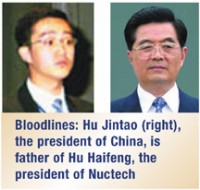[By China bureau chief Peh Shing Huei: "China's Corporate World Ruled by Princes - About 90 Percent of China's Billionaires Are the Children of High-Ranking Officials"]
Related websites: Anti-corruption measures by the government
BEIJING: It has been days since news first broke of a graft probe in Namibia into a firm formerly run by the son of Chinese President Hu Jintao.
Yet, in China, hardly anyone knows of the case. Nuctech -which makes security scanners and was headed by the 38-year-old Mr Hu Haifeng until last year -is being investigated over a lucrative contract it had won to deliver equipment to Namibia.

It is not known if the case, which happened last year, took place while Hu junior was still in charge.
There has been nothing to suggest that he is involved in any way in the probe, but Namibia's Anti-Corruption Commission has requested an interview with him and senior Nuctech management.
In China, discussions about the business dealings of the 'princelings' or taizidang -offspring of political leaders -are considered taboo. People might whisper about them over dinner tables, but will never discuss them in public.
Some princelings, such as Vice-President Xi Jinping, become public figures after being drawn into politics, but their counterparts in the corporate world shy away from the limelight. Nevertheless, they are a force to be reckoned with.
A 2006 study by several Chinese research institutions showed that almost 90 percent of the country's top leaders in sectors encompassing finance, foreign trade, property development, construction, and stock trading were princelings.
And about 90 percent of China's billionaires are the children of high-ranking officials.
Princelings have fared far better in business than in politics, observed analyst Zhang Hua, who commented on the phenomenon in Hong Kong's Apple Daily in 2007. 'Not a single (princeling) family has been left behind,' he said sardonically.
The various families have carved out territories in various industries.
The family of former premier Li Peng, for example, controls the country's energy sector. His daughter Li Xiaolin is chairman of China Power International Development, an electricity monopoly. His son Li Xiaopeng used to head Huaneng Power, another energy heavyweight.
The family of former Chinese president Jiang Zemin has moved into telecommunications, while the offspring of former premier Zhu Rongji are strong figures in banking. His son Levin Zhu is the chief executive of China International Capital Corp.
The princelings began staking out their dominions in the business world in the 1980s when China was opening up its economy.
Armed with their fathers' connections, they were able to exploit the opportunities thrown up by China's economic transformation. By the 1980s, this economic revolution had led to much public disquiet, and when students staged protests at Tiananmen Square in 1989, much of their anger was initially directed at what they saw as rampant corruption by senior officials and their families.
The bloody crackdown that followed left deep scars in the political psyches of most Chinese. For the princelings, Tiananmen provided further incentive to move away from politics into business.
'After 1989, princelings in politics suffered. They were very unpopular within the Chinese Communist Party,' explained analyst Bo Zhiyue, an expert on China's elite politics at the National University of Singapore's East Asian Institute.
'It was very hard for them to get into the Central Committee. They were not chosen at internal elections because of their family names, so many left politics and jumped into the corporate world.'
After Tiananmen, their business dealings became even more politically sensitive. A bad slip could see their fathers stepping on that proverbial banana skin and tumbling from power.
For President Hu -who has repeatedly pointed out that the battle against graft is 'a matter of life and death' -the timing of the Nuctech case could prove awkward. In just three months, on Oct 1, the nation will celebrate the 60th anniversary of the founding of Communist China -at which glorious occasion he is expected to be conferred the rare honour of a military review on Tiananmen Square.
Unsavoury rumours about the princelings' business activities do damage the image of the leaders concerned, said Hong Kong-based analyst Joseph Cheng. Still, he feels that any fallout from the Nuctech case will be extremely limited and that Mr Hu's political rivals are unlikely to use it against him because almost all the top leaders have family members with substantial stake in the corporate world.
Source: The Straits Times website, Singapore, in English 25 Jul 09
Related: Video: Netizens Fight Corruption in China
From Al Jazeera: China has long had a reputation for relatively high levels of graft. Almost everyone, including police, local officials, doctors and businessmen, expects and receives bribes. But netizens are now challenging the way business is done as Al Jazeera’s Melissa Chan reports from Beijing.
Related: AFP reports: China blackout on graft case linked to premier’s son:
China’s Internet censors blocked news Thursday about a graft probe in Namibia involving a firm linked to the son of President Hu Jintao, as the state-run media ignored the sensitive issue. Two Namibians and a Chinese national were arrested last week in Namibia as part of a probe into bribery allegations involving Nuctech, a company headed until last year by Hu’s 38-year-old son, Hu Haifeng. Searches for information on the case and Hu Haifeng’s connection to it on Chinese Web portals turned up error messages such as: “The search results may contain content not in line with relevant laws, regulations and policies.”
Such results on China’s heavily-censored Internet are typically returned when a Web user seeks banned information. China has a history of blocking access to sensitive data on the Internet, especially concerning politics and the lives of top leaders.
Related:
Prostitutes are considered more trustworthy in China than government officials and scientists, a recent survey done in June & July 2009 of more than 3,000 respondents showed.[read more]
Comic book a reminder for Chinese cadres to avoid graft (Xinhua 8 Jan 2008)


No comments:
Post a Comment